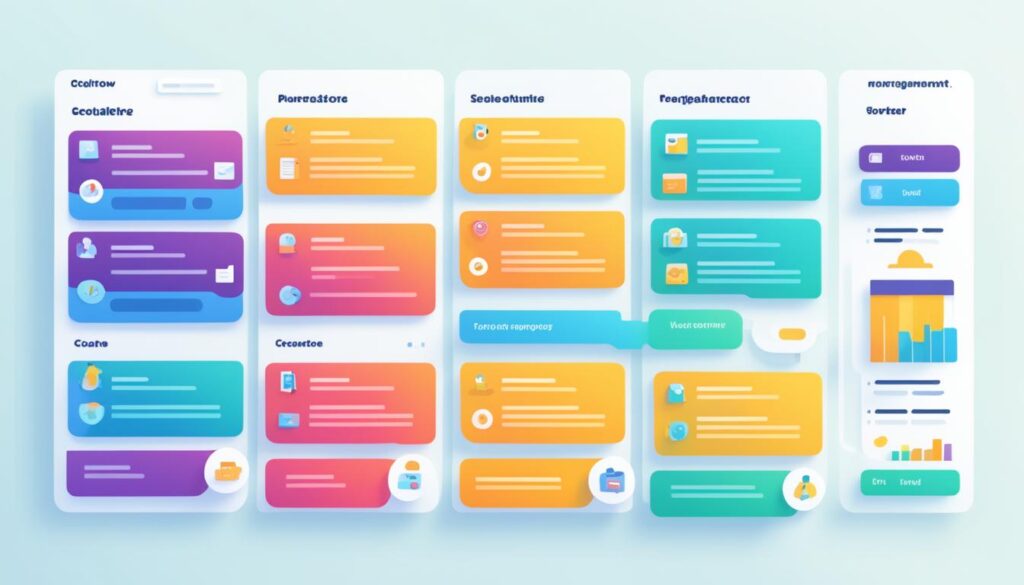In an era where professionals often juggle multiple responsibilities, understanding what is workflow task management becomes essential. A robust workflow establishes order within the pandemonium of the workplace, crucially carving out a path toward increased efficiency and productivity. The right workflow management software equips teams with a framework for tackling complex tasks and focusing collective efforts in a way that paves the road to success.
The construction of a workflow stretches beyond mere task delegation. It embodies the identification of specific steps, judicious allocation of resources, and clear-cut delineation of responsibilities. Additionally, crucial decision points and project outcomes are mapped out, crafting a blueprint for results that are both predictable and reproducible. With roots in early 20th-century manufacturing efficiency studies, the evolution of workflow principles has culminated in today’s advanced productivity software, a vital tool for any business seeking to improve its process management and achieve operational excellence.
Key Takeaways
- Defining workflow task management is the first step to mastering project complexity.
- Selecting suitable workflow management software can drastically enhance a team’s effectiveness.
- Productivity software is more than a convenience; it’s a competitive advantage in today’s market.
- Structured workflows translate into better resource allocation and heightened accountability.
- A well-implemented workflow system can revolutionize predictability and efficiency within any organization.
- Digital evolution of workflow concepts has been pivotal for modern business success.
- Clarity in roles and processes is a direct benefit of utilizing workflow task management.
The Importance of Workflow Management in Today’s Business Environment
In the fast-paced landscape of contemporary business, the implementation of an effective workflow management system is not just beneficial; it’s quintessential for sustained success. As the corporate arena becomes increasingly complex, the need for structured processes, facilitated by a robust project management tool, becomes crucial in navigating the intricacies of modern operations.
When we explore the realms of enhanced productivity and reduced project risk, the value of a sophisticated team collaboration platform cannot be overstated. It acts as the cornerstone for delineating work tasks with precision, allowing teams to perform with a clarity that was perhaps previously obscured by a muddled distribution of responsibilities.
Underpinning this methodological approach is the role of a task tracking system. Far from being a mere checklist, this system serves as a nerve center for capturing progress data and pinpointing areas that require intervention—effectively reducing response times and enhancing the ability for rapid course correction.
Let’s delve deeper into the strategic benefits achieved through workflow management:
- **Risk Mitigation**: By offering visible markers for potential impediments, workflow management aids in proactive troubleshooting.
- **Change Management**: A well-orchestrated workflow lays the groundwork for smoother transitions during periods of organizational change.
- **Information Accessibility**: Consolidated information repositories linked to workflow management ensure that knowledge is shared and leveraged effectively.
Moreover, an established workflow provides a certain degree of business continuity and managerial oversight, shaping strategies that are adaptable, resilient, and most importantly—competitive within the market.
Workflow management fosters a culture of accountability and continuous improvement—characteristics that resonate through the very DNA of modern enterprises seeking to thrive amidst an era of unprecedented change and competition.
In essence, the operational dexterity offered by advanced workflow management tools serves not only to optimize the here and now but also paves the path for future advancements that any dynamic business environment demands.
What is Workflow Task Management?
In the realm of boost productivity, there lies a pivotal component known as workflow task management. This system is at the heart of ensuring that tasks within a team collaboration platform are carried out effectively and that every individual is aware of their duties within the productivity software framework.
Defining Workflow Task Management
At its core, workflow task management involves the meticulous planning and tracking of various tasks required to complete a project. Utilizing task tracking systems helps in making this visual representation a reality, thereby aligning tasks with the overall objectives outlined by a project management tool. It revolves around a disciplined approach to managing and executing work, with ample support from workflow management software to track the progression of tasks from inception to completion.
The Core Components of a Workflow
When we dissect a workflow, we encounter several fundamental elements which include actors, activities, results, and states. Each component plays a crucial role within the task assignment software to assure that every part of the process is visible and manageable. It’s important not to lose sight of these elements, as each contributes to establishing a dependable and productive workflow environment.
| Component | Description | Role in Task Management |
|---|---|---|
| Actors | Individuals or machines responsible for executing tasks | Implement the actionable steps required |
| Activities | Structured tasks that build the workflow | Form the sequence of actions in the workflow |
| Results | Outcomes of each activity within the workflow | Indicate the success or need for improvement |
| States | Status of the project at various checkpoints | Offers a snapshot of progress at a point in time |
This blueprint, when documented diligently, allows for a clear and reproducible pattern within a workflow management software, ensuring that there is little deviation and maximum productivity.
Workflow Task Management vs. Project Management
Drawing a line between workflow task management and broader project management is pivotal. Although they are interlinked through platforms like project management tools and task assignment software, they cater to different needs. Workflow task management is the granular aspect that focuses on the moment-to-moment progression within a business process, monitored through a task tracking system. In contrast, the project management tool is concerned with the overarching scope, strategy, and execution of the entire project’s life cycle.

Clearly understanding this distinction is beneficial for any organization aiming to improve their efficiency through a team collaboration platform, as it dictates the type of systems and software required to manage their projects effectively.
Choosing the Right Workflow Management Software
Finding the optimal workflow management software is a key step in heightening organizational effectiveness and team productivity. The selection process demands careful consideration, ensuring the software aligns with the unique requirements and goals of your business. From customizability to functionality, every aspect plays a significant role in facilitating smoother operations.
Companies need to assess a variety of features that productivity software offers, especially how it allows teams to allocate, manage, and track tasks. The right task assignment software can dramatically enhance how responsibilities are distributed and monitored, leading to a tangible uptick in productivity and project success rates.

When selecting software, business leaders should also account for the breadth of workflow types the platform can support, ensuring comprehensive coverage across departments and projects. A robust application will adapt to the processes associated with various methodologies, serving as a versatile tool in any corporate environment.
| Feature | Benefit | Impact on Productivity |
|---|---|---|
| Custom Workflows | Aligns with specific business processes | Minimizes inefficiencies in task management |
| Automation Capabilities | Reduces repetitive manual tasks | Allows teams to focus on the high-impact activities |
| Integration Options | Connects with existing systems and data sources | Streamlines workflows by centralizing data |
| Real-time Reporting | Provides immediate insights into performance | Enables fast decision-making and issue resolution |
| Collaboration Tools | Facilitates clear communication and file sharing | Enhances team coordination and project transparency |
Workflow management software is more than just a convenience; it is an indispensable asset that when chosen wisely, aligns with strategies like Six Sigma or Lean systems and supports methodologies like Business Process Reengineering (BPR) or the Theory of Constraints.
The right software empowers teams to not only achieve daily tasks with greater efficiency but also to drive continuous process improvement—ultimately advancing your organization’s development and sustained success.
Key Features to Look for in Productivity Software
When seeking to bolster organizational efficiency, identifying the right productivity software infused with a comprehensive task tracking system becomes pivotal. As businesses grapple with complex workflows, the adoption of advanced workflow management software presents a strategic advantage. Below is an exploration of essential features that should influence your selection of a productivity stack.
Integration Capabilities
A transformative project management tool is not an isolated system; rather, it should seamlessly interlock with existing applications and platforms. This interoperability is crucial for unifying data and minimizing disruptions when transitioning between tasks. It elevates workflow management software from a mere utility to a centralized nerve center for business operations.
User Accessibility and Interface
Accessibility in team collaboration platforms is vital, necessitating a user-friendly interface that caters to all proficiency levels. The effectiveness of a productivity tool is often measured by its usability—how swiftly team members can adapt and how smoothly they can track and navigate their workload.
Task Assignment and Collaboration Features
Productivity software should break new ground in how team members assign and manage their tasks. Task assignment software should empower teams with robust collaboration features, ensuring that communication is as streamlined as the workflow it supports. This focus on shared objectives is the linchpin of successful project execution.
| Feature | Benefit | Common Tools Integrated |
|---|---|---|
| Seamless Integration | Centralizes processes, streamlines data flow | Email, Calendars, CRM Systems |
| Intuitive User Interface | Simplifies task navigation, boosts efficiency | Cloud Storage, Analytical Tools |
| Advanced Task Assignment | Clarifies responsibilities, enhances teamwork | Messaging Apps, File Sharing Services |
Ultimately, the efficacy of productivity software rests not only in its feature set but also in how cohesively it integrates as a task tracking system and project management tool. Imbuing a team collaboration platform with refined task assignment software features empowers businesses to not only manage but also to excel in their project execution.
Implementing Task Tracking Systems for Better Accountability
Accountability in the workplace is a cornerstone of productivity, and the integration of a task tracking system into your organization’s operations can transform the efficiency and clarity with which tasks are managed. Such systems are a key component of comprehensive workflow management software, enabling project managers and team members to stay aligned on responsibilities and timelines.
| Feature | Benefit | Impact on Productivity |
|---|---|---|
| Real-time Task Updates | Immediate awareness of task progress | Minimizes delays and bottlenecks in workflow |
| Transparent Task Ownership | Clarification of individual responsibilities | Prevents overlapping efforts and confusion |
| Automated Notifications | Alerts for deadlines and status changes | Ensures that high-priority tasks are addressed promptly |
| Reporting Tools | Insightful data analysis and forecasting | Enables proactive management and improvement of processes |
When productivity software is seamlessly integrated with these tracking systems, companies experience a significant uplift in their ability to manage workloads effectively. The judicious application of this technology offers a level of operational visibility that was previously impossible, laying the groundwork for a proactive rather than reactive approach to task management.
The embrace of a comprehensive task tracking system across your organization can dramatically reduce instances of task paralysis, where crucial projects stagnate due to unclear ownership or priority disputes. Instead, workflow management software can elevate the entire team’s performance, propelling your business towards its strategic objectives with greater precision and consistency.
Transforming Organizations with Task Assignment Software
Embracing task assignment software is not just about adopting a new tool—it is a transformative journey for an organization. By leveraging this advanced project management tool, companies can redefine their workflow efficiency and unlock a greater potential for growth. Through meticulously crafted workflows and a foundation built on sophisticated productivity software, organizations can unravel an efficient future.
Streamlining Processes with Automation
The inception of automation into operational workflows via modern task assignment software has revolutionized the way organizations approach task management. Automation propels both productivity and accuracy by automating repetitive tasks, thus reducing the potential for human error and freeing staff to concentrate on more complex, strategical tasks that require human ingenuity. Consequently, organizations are now experiencing a renaissance in process efficiency like never before.
Evaluating Success Through Reporting and Analytics
Advanced reporting and analytics are integral functionalities encapsulated within today’s workflow management software. These features present compelling insights by dissecting workflow performance and illuminating avenues for improvement. Decision-makers depend on these powerful analytics tools to harness historical data and translate it into actionable strategies, ensuring that every facet of the workflow is aligned with organizational objectives and is performing at its zenith.
Facilitating Change and Enhancing Team Collaboration
At the core of team collaboration platforms lies the ability to seamlessly assign and track tasks, promoting transparency and collective responsibility. Task assignment software fosters an environment where every team member is aware of their roles and how they contribute to the group’s mission. With such powerful collaboration tools embedded within workflow management software, teams can adapt more rapidly to new methodologies, embody change, and excel in a cohesive and supportive ecosystem.
As we navigate the technological advancements that define the 21st century, it becomes increasingly clear that harnessing the right productivity software is not an option but a necessity. Agile entities that embed workflow management software into their culture not only survive but thrive amidst the rising tides of change and innovation.
Conclusion
Understanding what is workflow task management is more than an operational necessity; it’s a strategic advantage in today’s competitive landscape. By meticulously choosing and incorporating advanced productivity software and team collaboration platforms, organizations in South Africa can initiate a transformative journey. The enhancement in workflow efficiency these tools bring forth are not just incremental; they are pivotal to scaling new heights of corporate efficiency and team dynamics.
Given the right workflow management software, companies can optimize their operational blueprint, ensuring each task performs seamlessly within the collective mission. With the implementation of comprehensive task tracking systems, accountability is never in question, creating an environment where transparency and productivity thrive. This intrinsic clarity in process and responsibility amplifies the momentum toward achieving business targets with precision and agility.
In essence, the fusion of top-tier workflow management systems with cutting-edge productivity tools consolidates the essence of what smart, future-facing project management looks like. It’s this robust framework that enables teams across diverse industries to collaborate effectively and meet complex challenges head-on, securing not just present success but also paving the way for innovative growth and sustainable development in the South African marketplace.








